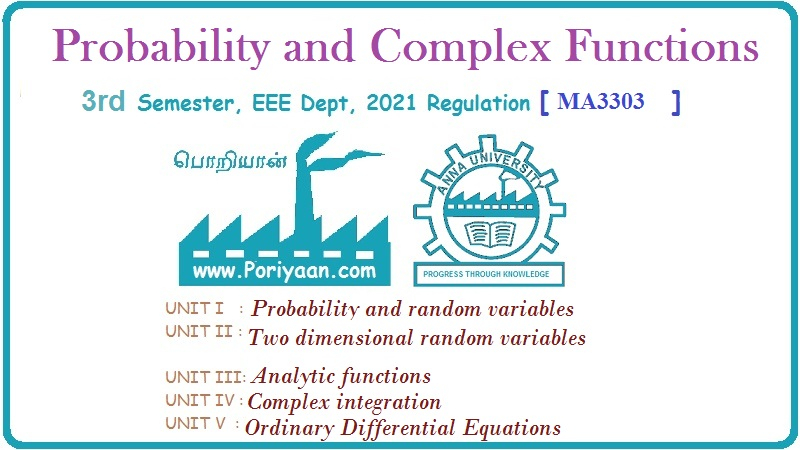Probability and complex function: Unit II: Two dimensional random variables
Covariance, correlation and regression: Example Solved Problems
Two dimensional random variables
Probability and complex function: Unit II: Two dimensional random variables : Examples
Example
2.2.1
Calculate
the correlation co-efficient for the following heights (in inches) of fathers X
and their sons Y.
[A.U.
N/D 2004, A/M 2015 (RP) R13]

Solution
:

The
correlation co-efficient of X and Y is given by,
r
(X, Y) = Cov (X, Y) / σX. σY = 3/ (2.121) (2.345) = 3 / 4.973
= 0.6032
Note:
Correlation co-efficient is independent of change of origin and scale.
i.e.,
r (X, Y) = r (U, V) where U = X - ɑ / h ; V = Y - b / K
where
a and b are some arbitrary constants usually the mid-values of the given data X
and Y respectively.
Example
2.2.2
Find
the rank correlation co-efficient from the following data:

Solution
:

Example
2.2.3
Ten
participants were ranked according to their performance in a mustical test by
the 3 Judges in the following data.

Using
rank correlation method, discuss which pair of judges has the nearest approach
to common likings of music.
Solution:
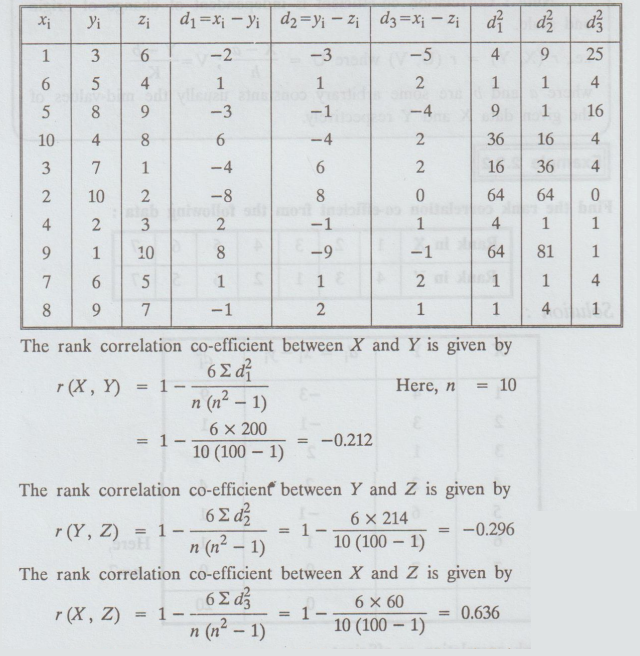
Since
the rank correlation coefficient between X and Z is positive and maximum, we
conclude that the pair of judges X and Z has the nearest approach to common
liking in music.
Example
2.2.4
Obtain
the rank correlation coefficient for the following data:

Solution
:

In
X series 75 is repeated twice which are in the positions 2nd and 3rd ranks.
Therefore common ranks 2.5 (which is the average of 2 and 3) is to be given for
each 75. Also in X series 64 is repeated thrice which are in the position 5th,
6th and 7th ranks.
Therefore
common ranks 6 (which is the average of 5, 6 and 7) is to be given for each 64.
Similarly
in Y series 68 is repeated twice which are in the positions 3rd and 4th ranks.
Therefore common ranks 3.5 (which is the average of 3 and 4) is to be given for
each 68.
Correction
factors
In
X series 75 is repeated twice
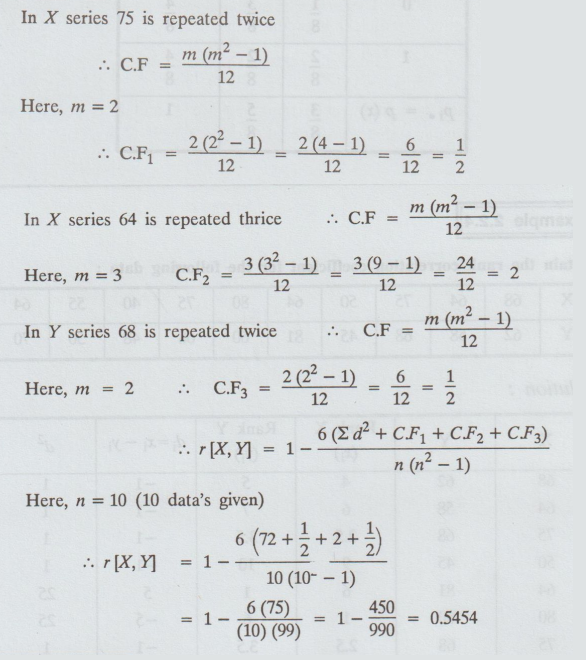
Example
2.2.5
The
joint probability mass function of X and Y is given below.
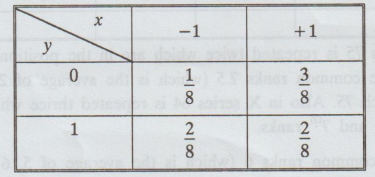
Find
the correlation coefficient of (X, Y).
Solution
:
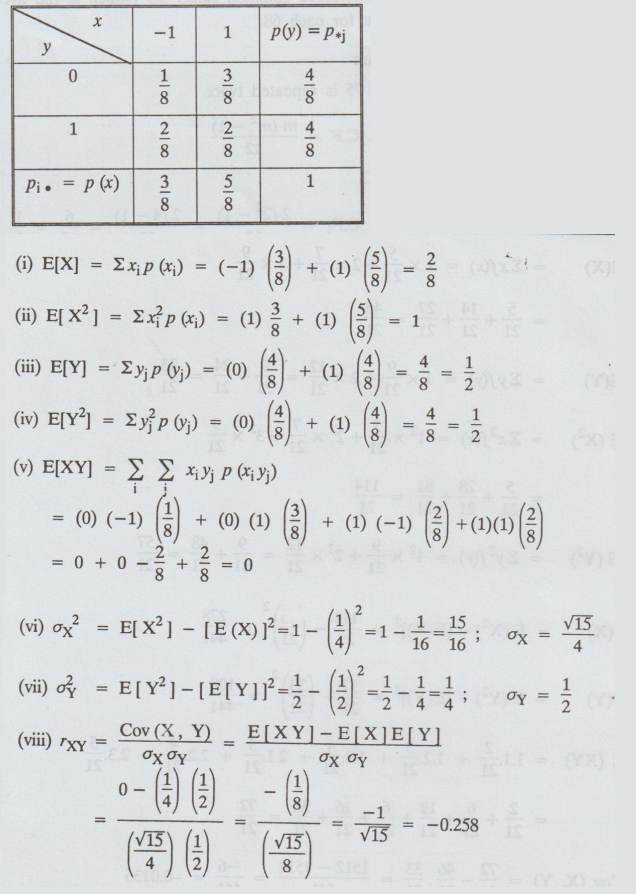
Example
2.2.6
Let
X and Y be discrete R.V's with probability function
f(x,
y) = x+y / 21 x = 1,2,3; y = 1,2.
[A.U N/D 2015 R13, CBT A/M 2011]
Find
(i) Mean and Variance of X and Y.
(ii)
Cov (X, Y)
(iii)
Correlation of X and Y.
[A.U
A/M 2019 (R17) PQT]

Example
2.2.7
Two
random variables X and Y have the joint density

[AU, N/D. 2004, M/J 2006, N/D 2010, Tvli A/M
2009, M/J 2010] [A.U. CBT M/J 2010] [A.U N/D 2011] [A.U A/M 2019 (R13) PQT]
Solution:
The
marginal density function of X is,

Example
2.2.8
Suppose
that the 2D RVs (X, Y) has the joint p.d.f.
 Obtain
the correlation co-efficient between X and Y.
Obtain
the correlation co-efficient between X and Y.
Check
whether X and Y are independent.
[AU,
N/D, 2003, 2004] [A.U Tvli M/J 2010] [A.U A/M 2010] [A.U CBT N/D 2011] [A.U N/D
2017 (RP) R-13]
Solution:
The marginal density function of X is given by,
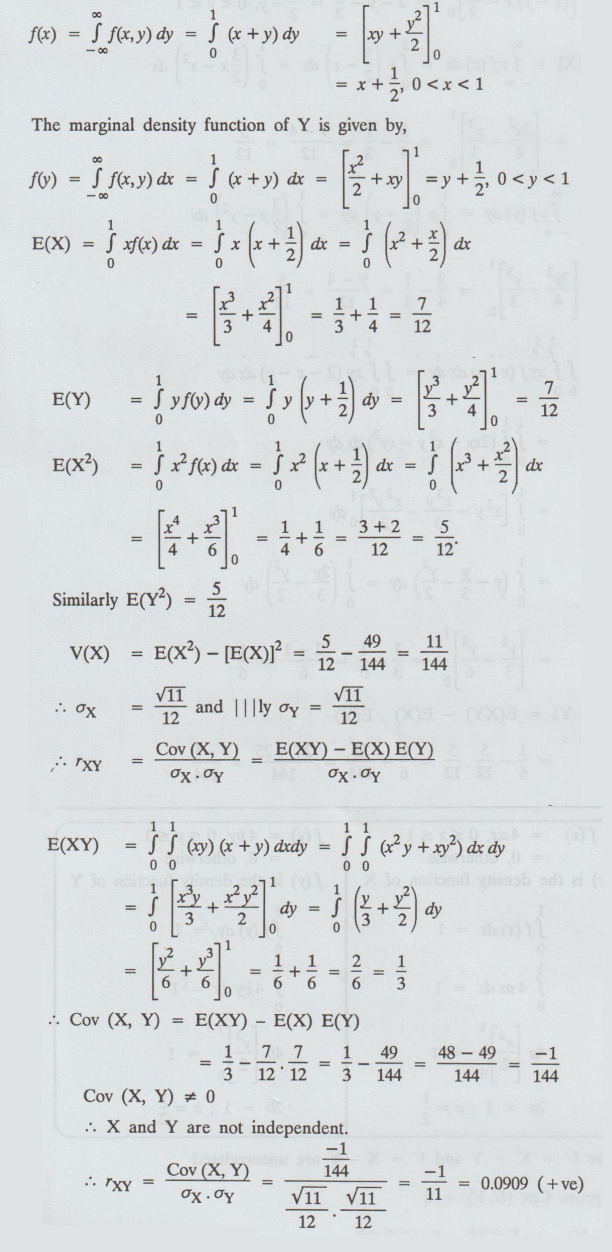
Example
2.2.9
Let
X be a random variable with p.d.f f(x) = 1/2, -1 ≤ x ≤ 1 and let Y = X2.
Prove that, the correlation co-efficient between X and Y is zero.
Solution:
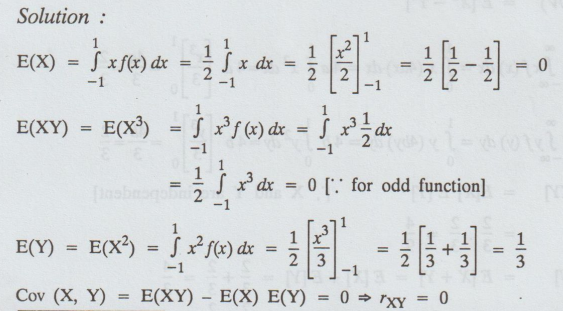
Example
2.2.10
Two
independent random variables X and Y are defined by,
f(x)
= 4 ax, 0 ≤ x ≤ 1
=
0, otherwise
f(y)=
4 by, 0 ≤ y ≤ 1
=
0, otherwise
Show
that U = X + Y and V = X - Y are uncorrelated.
[AU
A/M 2003, N/D 2012, M/J 2013]
Solution
:
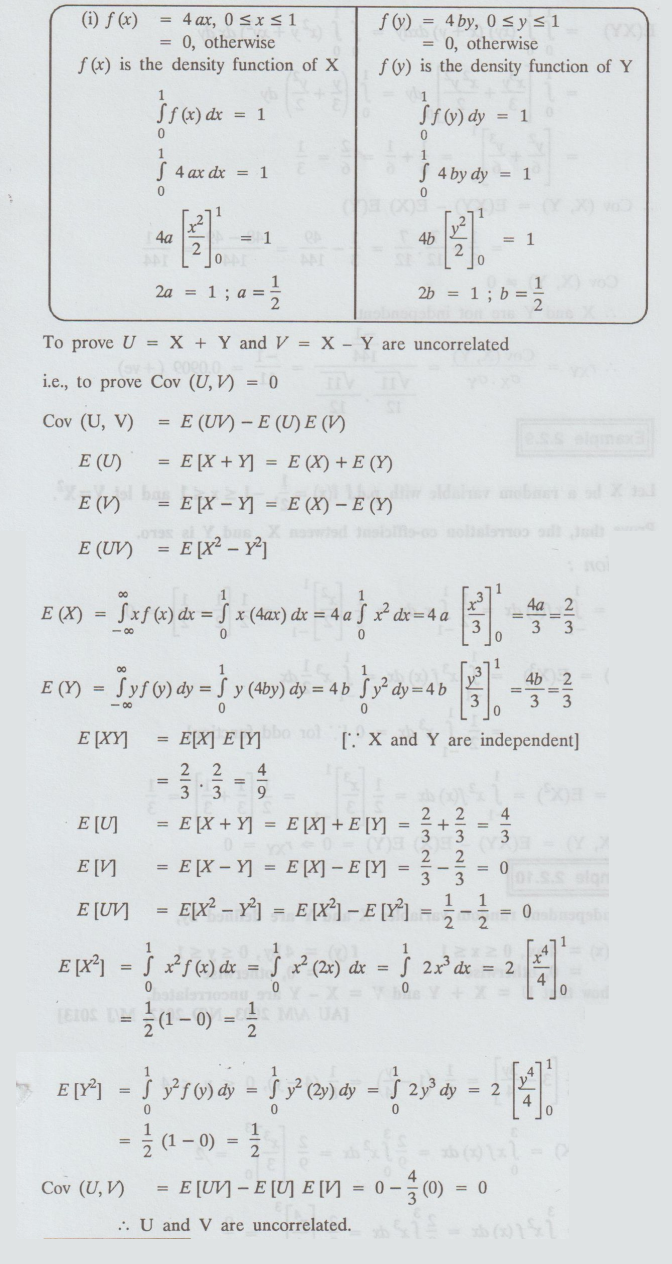
Example
2.2.11
If
(X, Y) is a two-dimensional random variable uniformly distributed over the
triangular region R bounded by y = 0, x = 3, and y = 4/3 x. Find the correlation
coefficient rxy.
[A.U.]
Sol.
(X,
Y) is uniformly distributed, f(x, y) = K, constant (say)
To
find the point of Xn of x = 3 and y = 4 / 3x
y
= 4 / 3 x, where x = 3 ⇒ y = 4
f(x,
y) is a pdf, we have

Example
2.2.12
Let
X1 and X2 be two independent random variables with means
5 and 10 and standard deviations 2 and 3 respectively. Obtain rUV
where U = 3X1 + 4X2 and V = 3X1 - X2. [A.U N/D 2019 (R17) PS]
Solution:

Probability and complex function: Unit II: Two dimensional random variables : Tag: : Two dimensional random variables - Covariance, correlation and regression: Example Solved Problems
Related Topics
Related Subjects
Probability and complex function
MA3303 3rd Semester EEE Dept | 2021 Regulation | 3rd Semester EEE Dept 2021 Regulation
